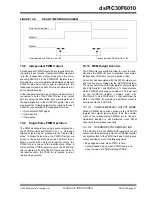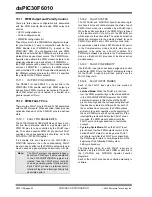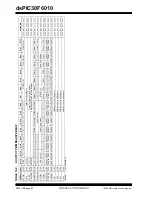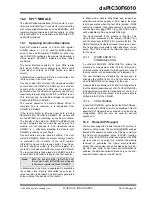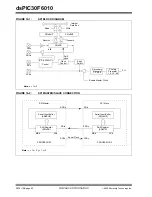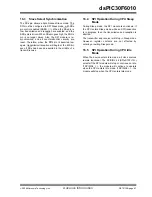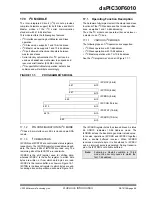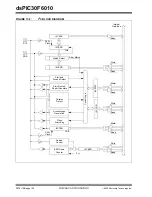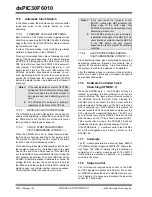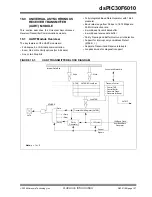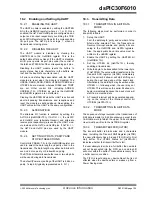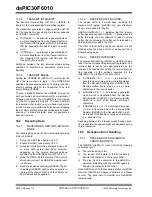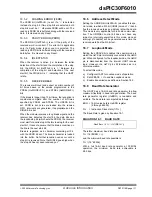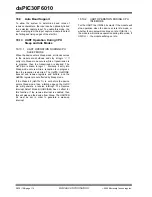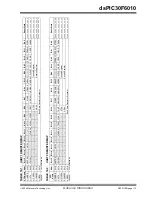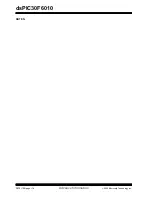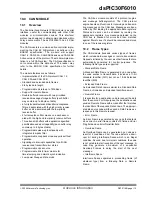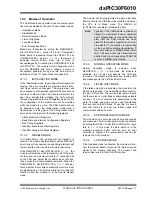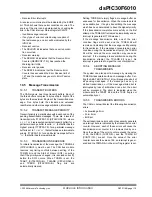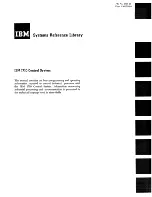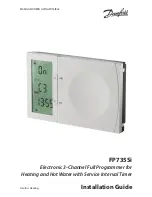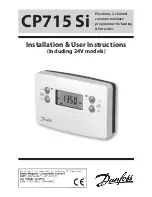
dsPIC30F6010
DS70119B-page 104
Advance Information
2004 Microchip Technology Inc.
17.12.4
CLOCK ARBITRATION
Clock arbitration occurs when the master de-asserts
the SCL pin (SCL allowed to float high) during any
receive, transmit, or Restart/Stop condition. When the
SCL pin is allowed to float high, the baud rate generator
(BRG) is suspended from counting until the SCL pin is
actually sampled high. When the SCL pin is sampled
high, the baud rate generator is reloaded with the con-
tents of I2CBRG and begins counting. This ensures
that the SCL high time will always be at least one BRG
rollover count in the event that the clock is held low by
an external device.
17.12.5
MULTI-MASTER COMMUNICATION,
BUS COLLISION AND BUS
ARBITRATION
Multi-Master operation support is achieved by bus arbi-
tration. When the master outputs address/data bits
onto the SDA pin, arbitration takes place when the
master outputs a
1
on SDA, by letting SDA float high
while another master asserts a
0
. When the SCL pin
floats high, data should be stable. If the expected data
on SDA is a
1
and the data sampled on the SDA
pin = 0, then a bus collision has taken place. The mas-
ter will set the MI2CIF pulse and reset the master por-
tion of the I
2
C port to its Idle state.
If a transmit was in progress when the bus collision
occurred, the transmission is halted, the TBF flag is
cleared, the SDA and SCL lines are de-asserted, and a
value can now be written to I2CTRN. When the user
services the I
2
C master event Interrupt Service Rou-
tine, if the I
2
C bus is free (i.e., the P bit is set) the user
can resume communication by asserting a Start
condition.
If a Start, Restart, Stop or Acknowledge condition was
in progress when the bus collision occurred, the condi-
tion is aborted, the SDA and SCL lines are de-asserted,
and the respective control bits in the I2CCON register
are cleared to
0
. When the user services the bus colli-
sion Interrupt Service Routine, and if the I
2
C bus is free,
the user can resume communication by asserting a
Start condition.
The Master will continue to monitor the SDA and SCL
pins, and if a Stop condition occurs, the MI2CIF bit will
be set.
A write to the I2CTRN will start the transmission of data
at the first data bit, regardless of where the transmitter
left off when bus collision occurred.
In a Multi-Master environment, the interrupt generation
on the detection of Start and Stop conditions allows the
determination of when the bus is free. Control of the I
2
C
bus can be taken when the P bit is set in the I2CSTAT
register, or the bus is Idle and the S and P bits are
cleared.
17.13 I
2
C Module Operation During CPU
Sleep and Idle Modes
17.13.1
I
2
C OPERATION DURING CPU
SLEEP MODE
When the device enters Sleep mode, all clock sources
to the module are shutdown and stay at logic ‘
0
’. If
Sleep occurs in the middle of a transmission, and the
state machine is partially into a transmission as the
clocks stop, then the transmission is aborted. Similarly,
if Sleep occurs in the middle of a reception, then the
reception is aborted.
17.13.2
I
2
C OPERATION DURING CPU IDLE
MODE
For the I
2
C, the I2CSIDL bit selects if the module will
stop on Idle or continue on Idle. If I2CSIDL =
0
, the
module will continue operation on assertion of the Idle
mode. If I2CSIDL =
1
, the module will stop on Idle.
Summary of Contents for dsPIC30F6010
Page 12: ...dsPIC30F6010 DS70119B page 10 Advance Information 2004 Microchip Technology Inc NOTES...
Page 32: ...dsPIC30F6010 DS70119B page 30 Advance Information 2004 Microchip Technology Inc NOTES...
Page 38: ...dsPIC30F6010 DS70119B page 36 Advance Information 2004 Microchip Technology Inc NOTES...
Page 50: ...dsPIC30F6010 DS70119B page 48 Advance Information 2004 Microchip Technology Inc NOTES...
Page 68: ...dsPIC30F6010 DS70119B page 66 Advance Information 2004 Microchip Technology Inc NOTES...
Page 72: ...dsPIC30F6010 DS70119B page 70 Advance Information 2004 Microchip Technology Inc NOTES...
Page 76: ...dsPIC30F6010 DS70119B page 74 Advance Information 2004 Microchip Technology Inc NOTES...
Page 86: ...dsPIC30F6010 DS70119B page 84 Advance Information 2004 Microchip Technology Inc NOTES...
Page 108: ...dsPIC30F6010 DS70119B page 106 Advance Information 2004 Microchip Technology Inc NOTES...
Page 116: ...dsPIC30F6010 DS70119B page 114 Advance Information 2004 Microchip Technology Inc NOTES...
Page 128: ...dsPIC30F6010 DS70119B page 126 Advance Information 2004 Microchip Technology Inc NOTES...
Page 150: ...dsPIC30F6010 DS70119B page 148 Advance Information 2004 Microchip Technology Inc NOTES...
Page 164: ...dsPIC30F6010 DS70119B page 162 Advance Information 2004 Microchip Technology Inc NOTES...
Page 208: ...dsPIC30F6010 DS70119B page 206 Advance Information 2004 Microchip Technology Inc NOTES...
Page 220: ...dsPIC30F6010 DS70119B page 220 Advance Information 2004 Microchip Technology Inc NOTES...
Page 221: ...2004 Microchip Technology Inc Advance Information DS70119B page 221 dsPIC30F6010 NOTES...


